
ppl.llm.serving
None
Stars: 126
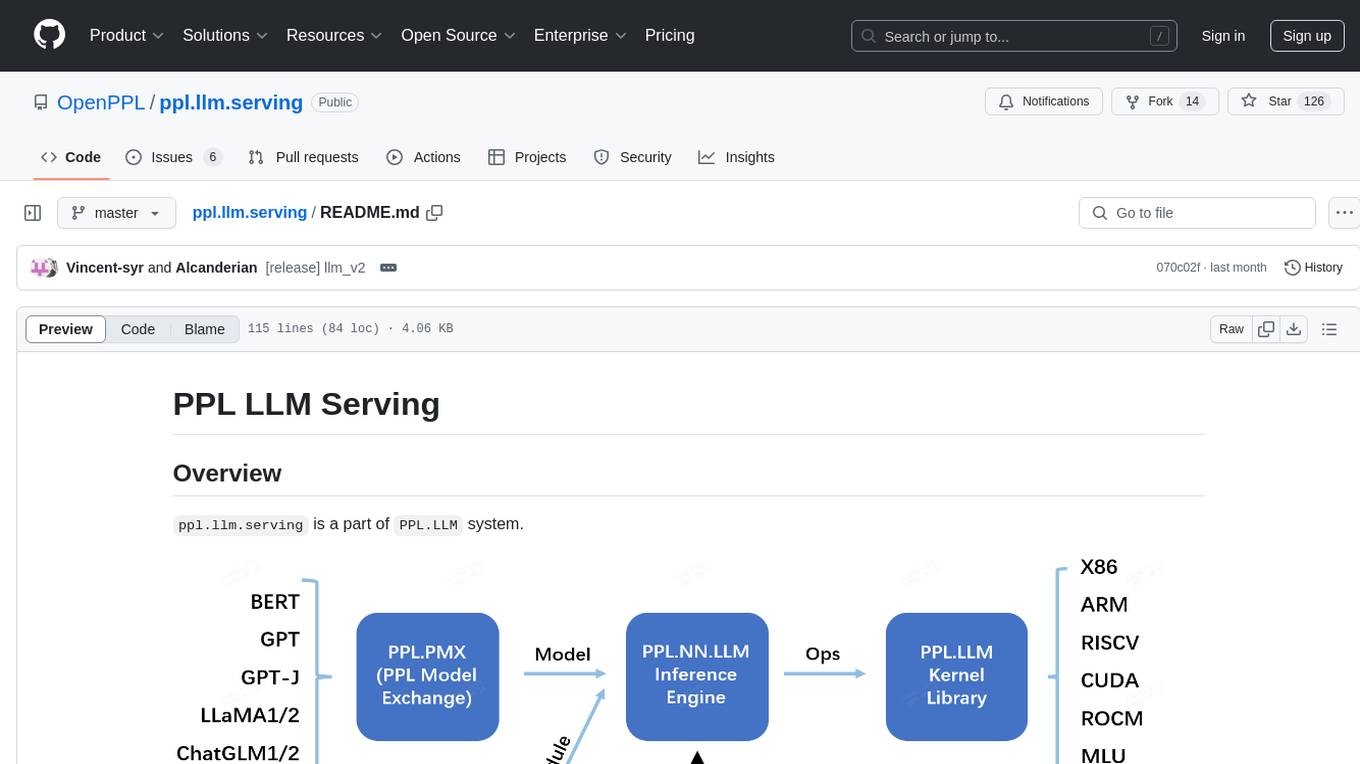
ppl.llm.serving is a serving component for Large Language Models (LLMs) within the PPL.LLM system. It provides a server based on gRPC and supports inference for LLaMA. The repository includes instructions for prerequisites, quick start guide, model exporting, server setup, client usage, benchmarking, and offline inference. Users can refer to the LLaMA Guide for more details on using this serving component.
README:
ppl.llm.serving is a part of PPL.LLM system.
We recommend users who are new to this project to read the Overview of system.
ppl.llm.serving is a serving based on ppl.nn for various Large Language Models(LLMs). This repository contains a server based on gRPC and inference support for LLaMA.
- Linux running on x86_64 or arm64 CPUs
- GCC >= 9.4.0
- CMake >= 3.18
- Git >= 2.7.0
- CUDA Toolkit >= 11.4. 11.6 recommended. (for CUDA)
- Rust & cargo >= 1.8.0. (for Huggingface Tokenizer)
Here is a brief tutorial, refer to LLaMA Guide for more details.
-
Installing Prerequisites(on Debian or Ubuntu for example)
apt-get install build-essential cmake git
-
Cloning Source Code
git clone https://github.com/openppl-public/ppl.llm.serving.git
-
Building from Source
./build.sh -DPPLNN_USE_LLM_CUDA=ON -DPPLNN_CUDA_ENABLE_NCCL=ON -DPPLNN_ENABLE_CUDA_JIT=OFF -DPPLNN_CUDA_ARCHITECTURES="'80;86;87'" -DPPLCOMMON_CUDA_ARCHITECTURES="'80;86;87'" -DPPL_LLM_ENABLE_GRPC_SERVING=ON
NCCL is required if multiple GPU devices are used.
We support Sync Decode feature (mainly for offline_inference), which means model forward and decode in the same thread. To enable this feature, compile with marco
-DPPL_LLM_SERVING_SYNC_DECODE=ON. -
Exporting Models
Refer to ppl.pmx for details.
-
Running Server
./ppl_llm_server \ --model-dir /data/model \ --model-param-path /data/model/params.json \ --tokenizer-path /data/tokenizer.model \ --tensor-parallel-size 1 \ --top-p 0.0 \ --top-k 1 \ --max-tokens-scale 0.94 \ --max-input-tokens-per-request 4096 \ --max-output-tokens-per-request 4096 \ --max-total-tokens-per-request 8192 \ --max-running-batch 1024 \ --max-tokens-per-step 8192 \ --host 127.0.0.1 \ --port 23333You are expected to give the correct values before running the server.
-
model-dir: path of models exported by ppl.pmx. -
model-param-path: params of models.$model_dir/params.json. -
tokenizer-path: tokenizer files forsentencepiece.
-
-
Running client: send request through gRPC to query the model
./ppl-build/client_sample 127.0.0.1:23333
See tools/client_sample.cc for more details.
-
Benchmarking
./ppl-build/client_qps_measure --target=127.0.0.1:23333 --tokenizer=/path/to/tokenizer/path --dataset=tools/samples_1024.json --request_rate=inf
See tools/client_qps_measure.cc for more details.
--request_rateis the number of request per second, and valueinfmeans send all client request with no interval. -
Running inference offline:
./offline_inference \ --model-dir /data/model \ --model-param-path /data/model/params.json \ --tokenizer-path /data/tokenizer.model \ --tensor-parallel-size 1 \ --top-p 0.0 \ --top-k 1 \ --max-tokens-scale 0.94 \ --max-input-tokens-per-request 4096 \ --max-output-tokens-per-request 4096 \ --max-total-tokens-per-request 8192 \ --max-running-batch 1024 \ --max-tokens-per-step 8192 \ --host 127.0.0.1 \ --port 23333See tools/offline_inference.cc for more details.
This project is distributed under the Apache License, Version 2.0.
For Tasks:
Click tags to check more tools for each tasksFor Jobs:
Alternative AI tools for ppl.llm.serving
Similar Open Source Tools

ppl.llm.serving
ppl.llm.serving is a serving component for Large Language Models (LLMs) within the PPL.LLM system. It provides a server based on gRPC and supports inference for LLaMA. The repository includes instructions for prerequisites, quick start guide, model exporting, server setup, client usage, benchmarking, and offline inference. Users can refer to the LLaMA Guide for more details on using this serving component.

starcoder2-self-align
StarCoder2-Instruct is an open-source pipeline that introduces StarCoder2-15B-Instruct-v0.1, a self-aligned code Large Language Model (LLM) trained with a fully permissive and transparent pipeline. It generates instruction-response pairs to fine-tune StarCoder-15B without human annotations or data from proprietary LLMs. The tool is primarily finetuned for Python code generation tasks that can be verified through execution, with potential biases and limitations. Users can provide response prefixes or one-shot examples to guide the model's output. The model may have limitations with other programming languages and out-of-domain coding tasks.
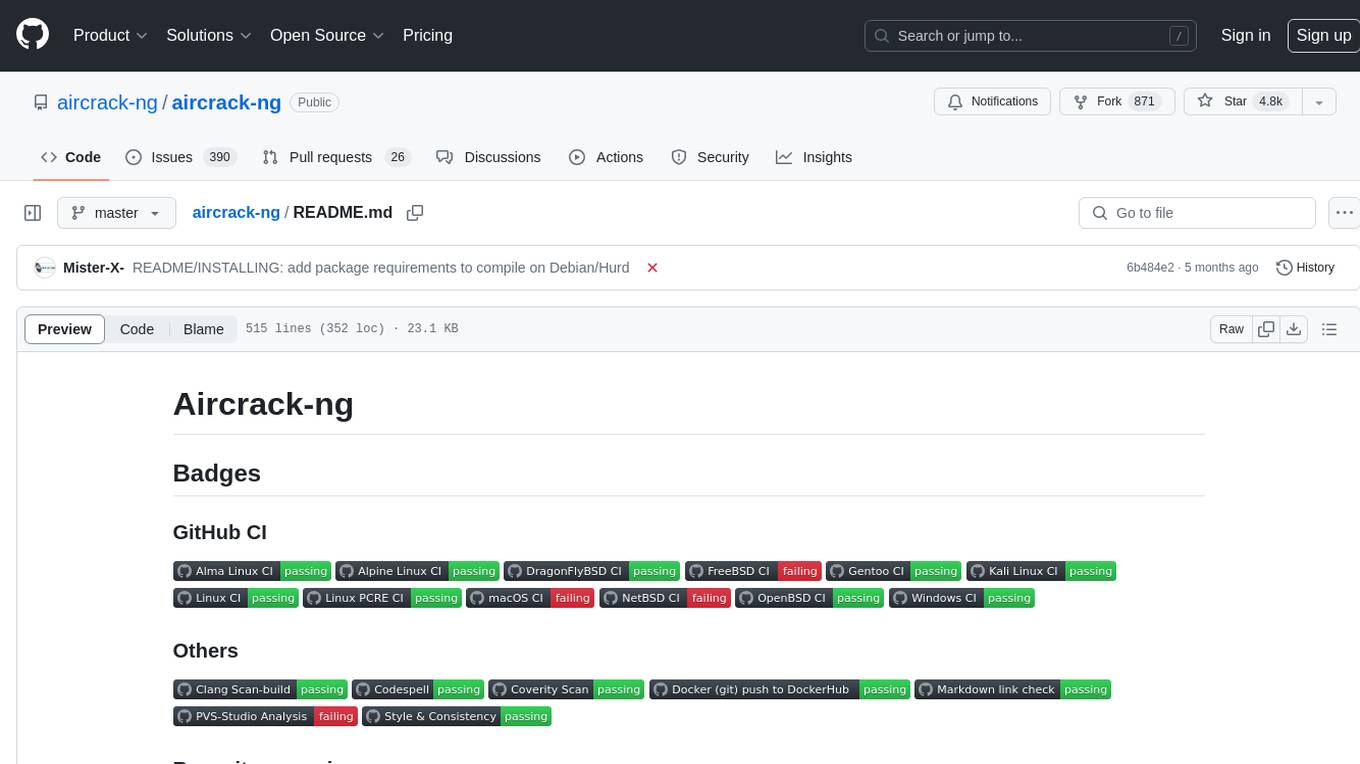
aircrack-ng
Aircrack-ng is a comprehensive suite of tools designed to evaluate the security of WiFi networks. It covers various aspects of WiFi security, including monitoring, attacking (replay attacks, deauthentication, fake access points), testing WiFi cards and driver capabilities, and cracking WEP and WPA PSK. The tools are command line-based, allowing for extensive scripting and have been utilized by many GUIs. Aircrack-ng primarily works on Linux but also supports Windows, macOS, FreeBSD, OpenBSD, NetBSD, Solaris, and eComStation 2.
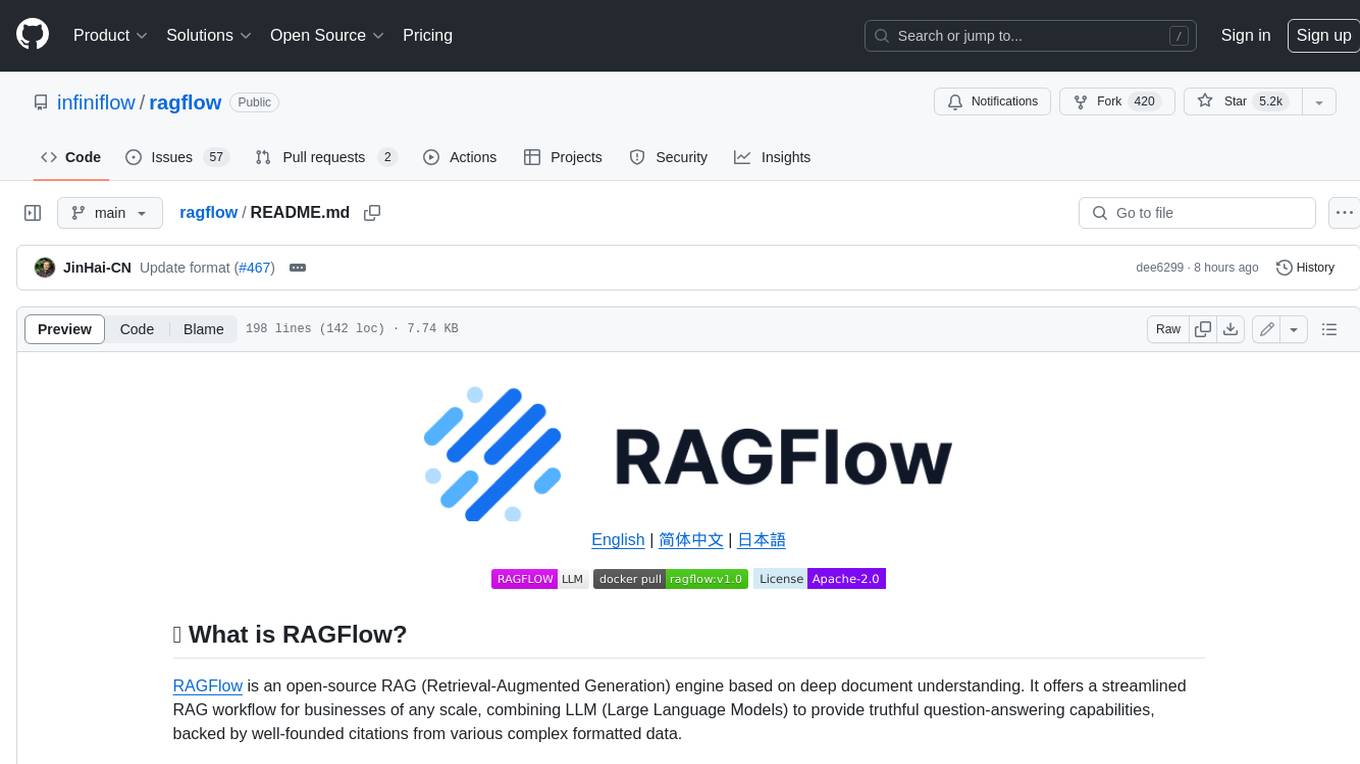
ragflow
RAGFlow is an open-source Retrieval-Augmented Generation (RAG) engine that combines deep document understanding with Large Language Models (LLMs) to provide accurate question-answering capabilities. It offers a streamlined RAG workflow for businesses of all sizes, enabling them to extract knowledge from unstructured data in various formats, including Word documents, slides, Excel files, images, and more. RAGFlow's key features include deep document understanding, template-based chunking, grounded citations with reduced hallucinations, compatibility with heterogeneous data sources, and an automated and effortless RAG workflow. It supports multiple recall paired with fused re-ranking, configurable LLMs and embedding models, and intuitive APIs for seamless integration with business applications.
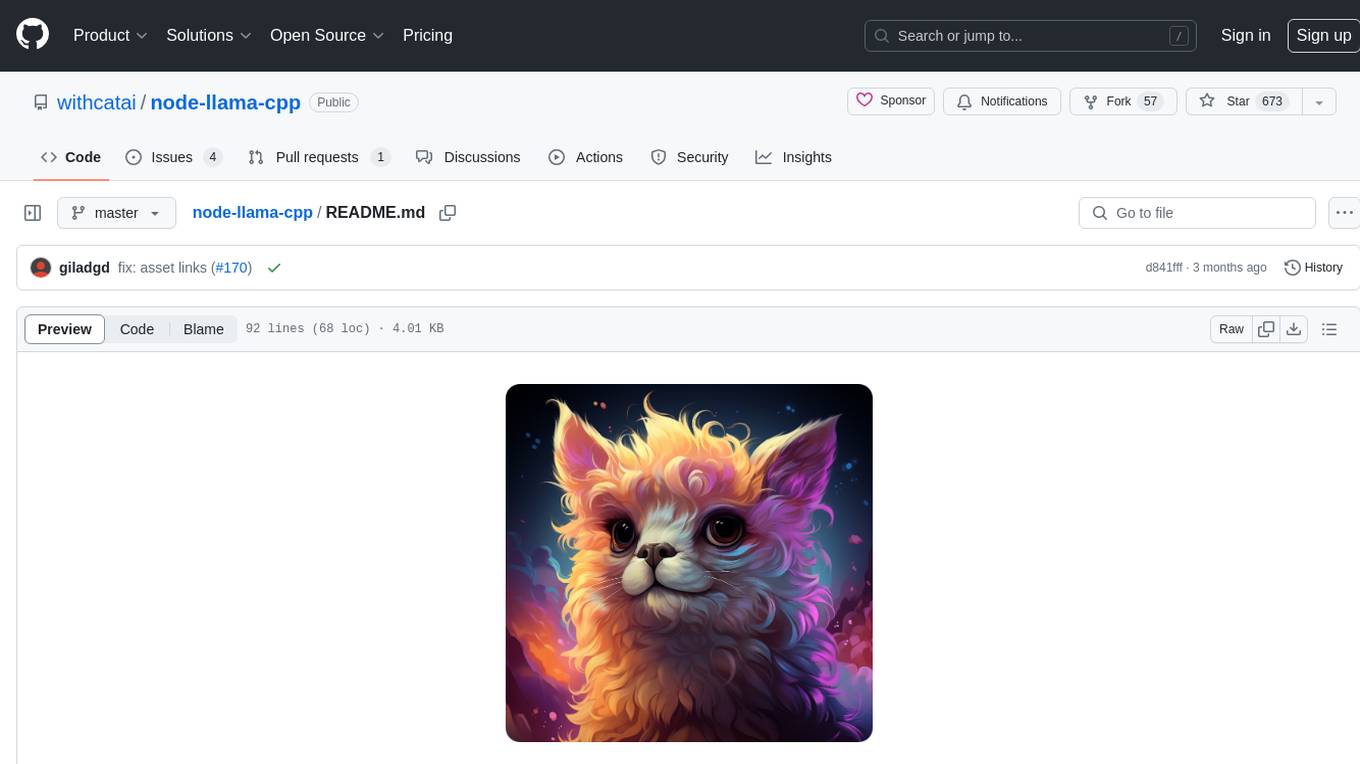
node-llama-cpp
node-llama-cpp is a tool that allows users to run AI models locally on their machines. It provides pre-built bindings with the option to build from source using cmake. Users can interact with text generation models, chat with models using a chat wrapper, and force models to generate output in a parseable format like JSON. The tool supports Metal and CUDA, offers CLI functionality for chatting with models without coding, and ensures up-to-date compatibility with the latest version of llama.cpp. Installation includes pre-built binaries for macOS, Linux, and Windows, with the option to build from source if binaries are not available for the platform.
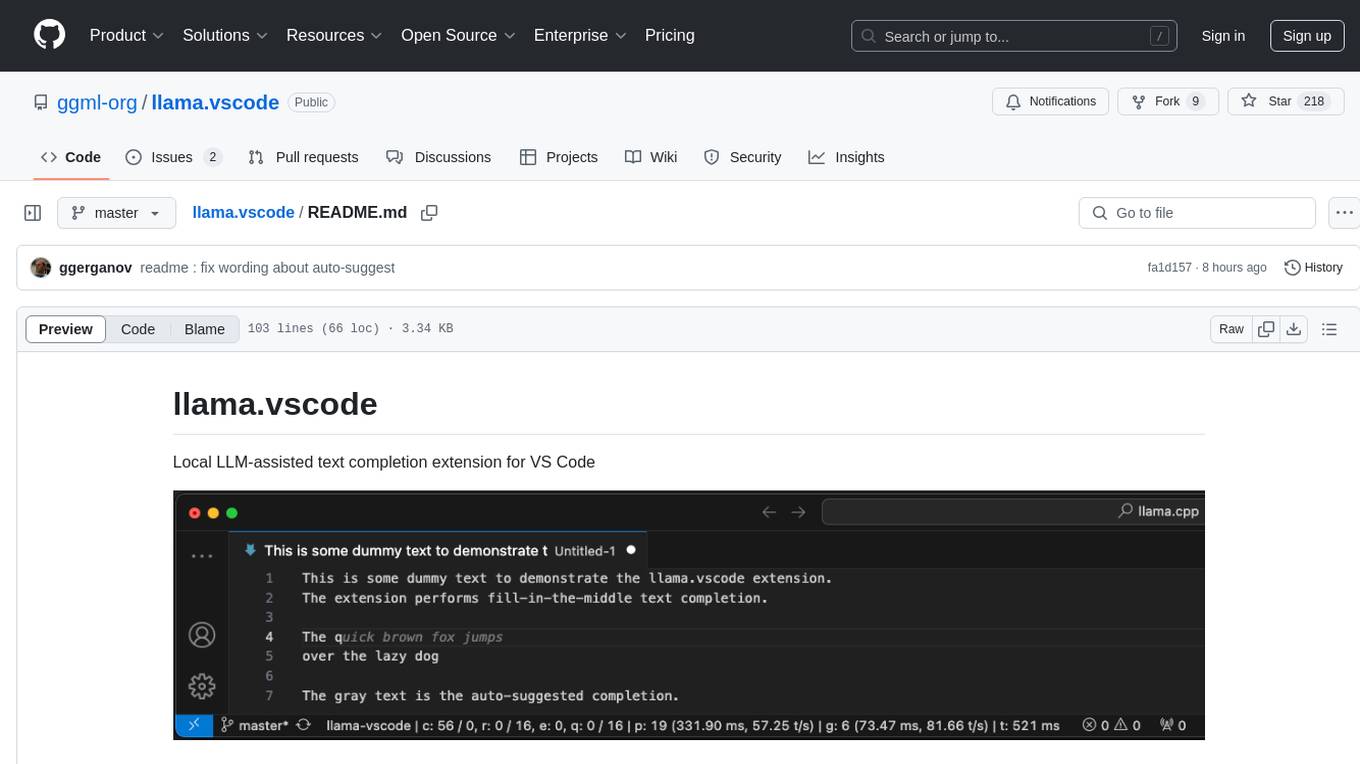
llama.vscode
llama.vscode is a local LLM-assisted text completion extension for Visual Studio Code. It provides auto-suggestions on input, allows accepting suggestions with shortcuts, and offers various features to enhance text completion. The extension is designed to be lightweight and efficient, enabling high-quality completions even on low-end hardware. Users can configure the scope of context around the cursor and control text generation time. It supports very large contexts and displays performance statistics for better user experience.
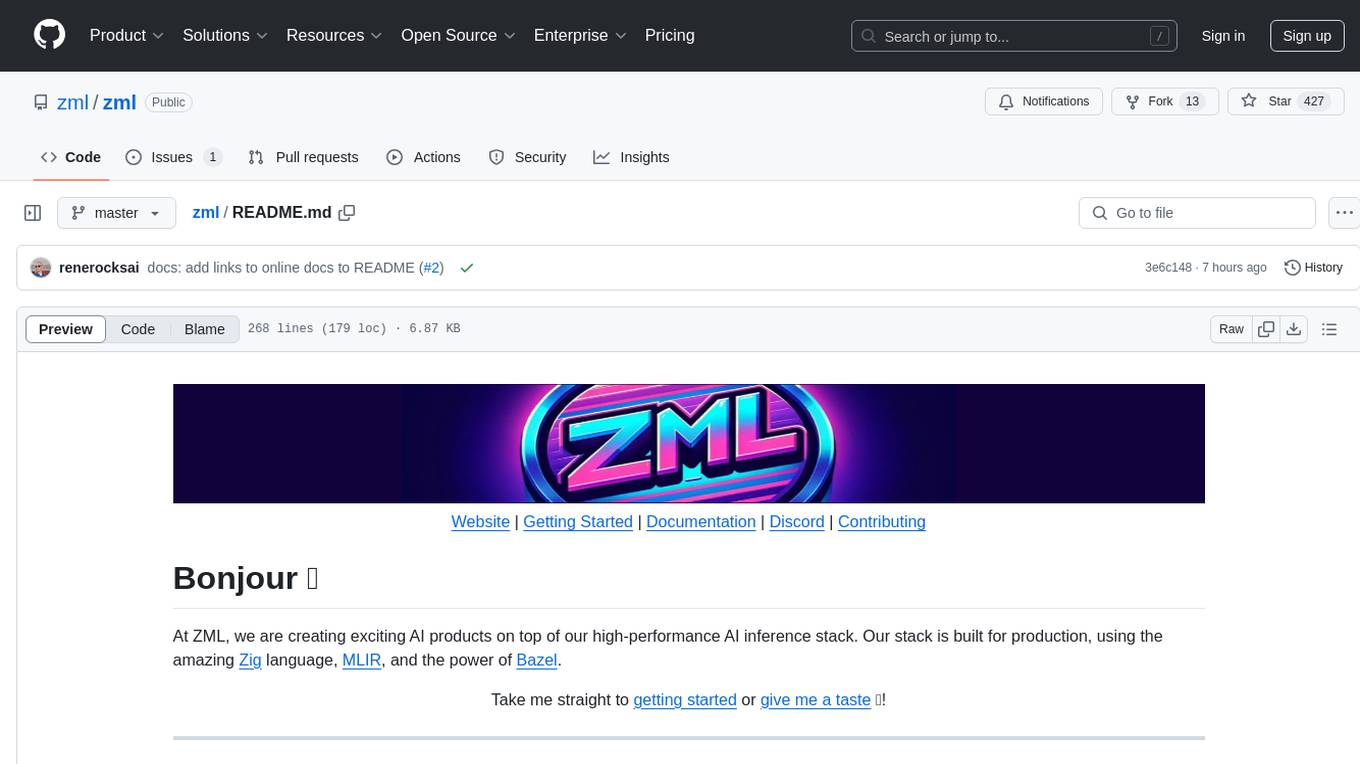
zml
ZML is a high-performance AI inference stack built for production, using Zig language, MLIR, and Bazel. It allows users to create exciting AI projects, run pre-packaged models like MNIST, TinyLlama, OpenLLama, and Meta Llama, and compile models for accelerator runtimes. Users can also run tests, explore examples, and contribute to the project. ZML is licensed under the Apache 2.0 license.
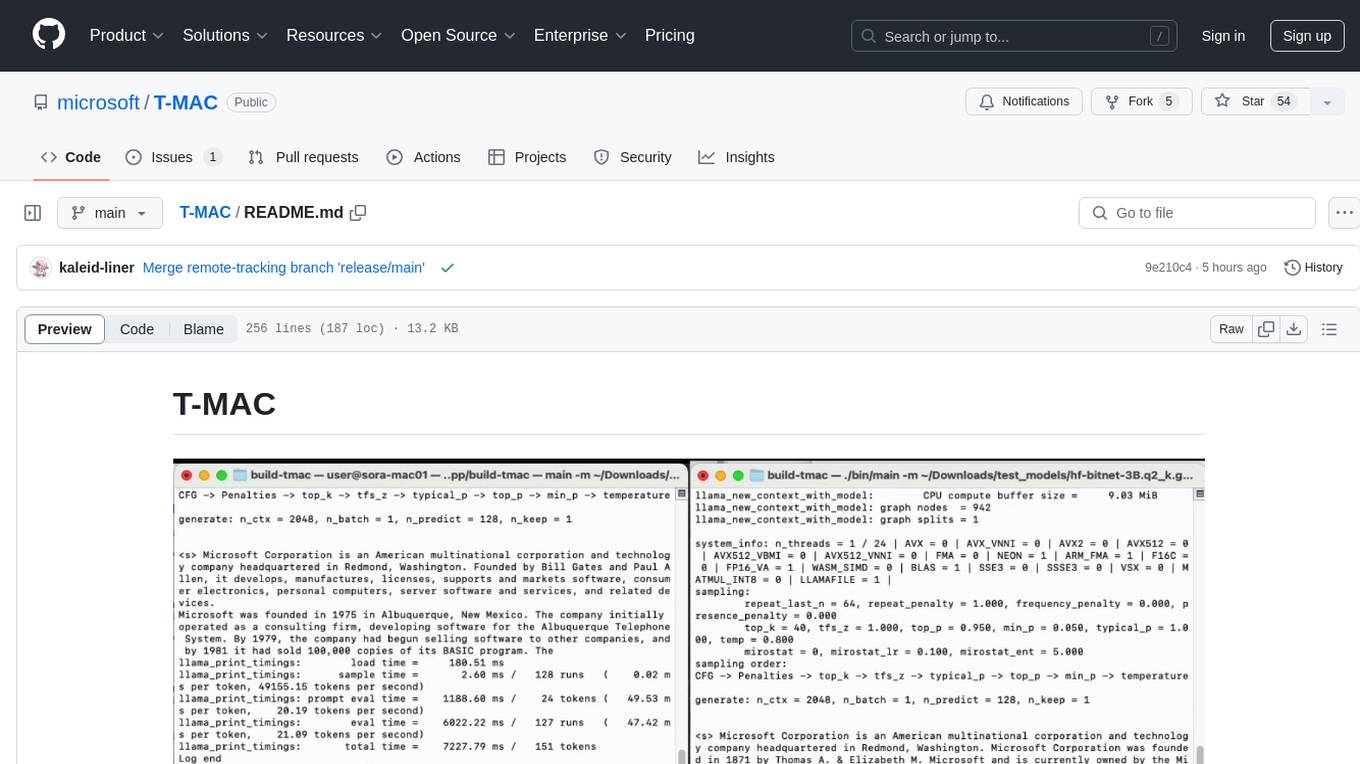
T-MAC
T-MAC is a kernel library that directly supports mixed-precision matrix multiplication without the need for dequantization by utilizing lookup tables. It aims to boost low-bit LLM inference on CPUs by offering support for various low-bit models. T-MAC achieves significant speedup compared to SOTA CPU low-bit framework (llama.cpp) and can even perform well on lower-end devices like Raspberry Pi 5. The tool demonstrates superior performance over existing low-bit GEMM kernels on CPU, reduces power consumption, and provides energy savings. It achieves comparable performance to CUDA GPU on certain tasks while delivering considerable power and energy savings. T-MAC's method involves using lookup tables to support mpGEMM and employs key techniques like precomputing partial sums, shift and accumulate operations, and utilizing tbl/pshuf instructions for fast table lookup.
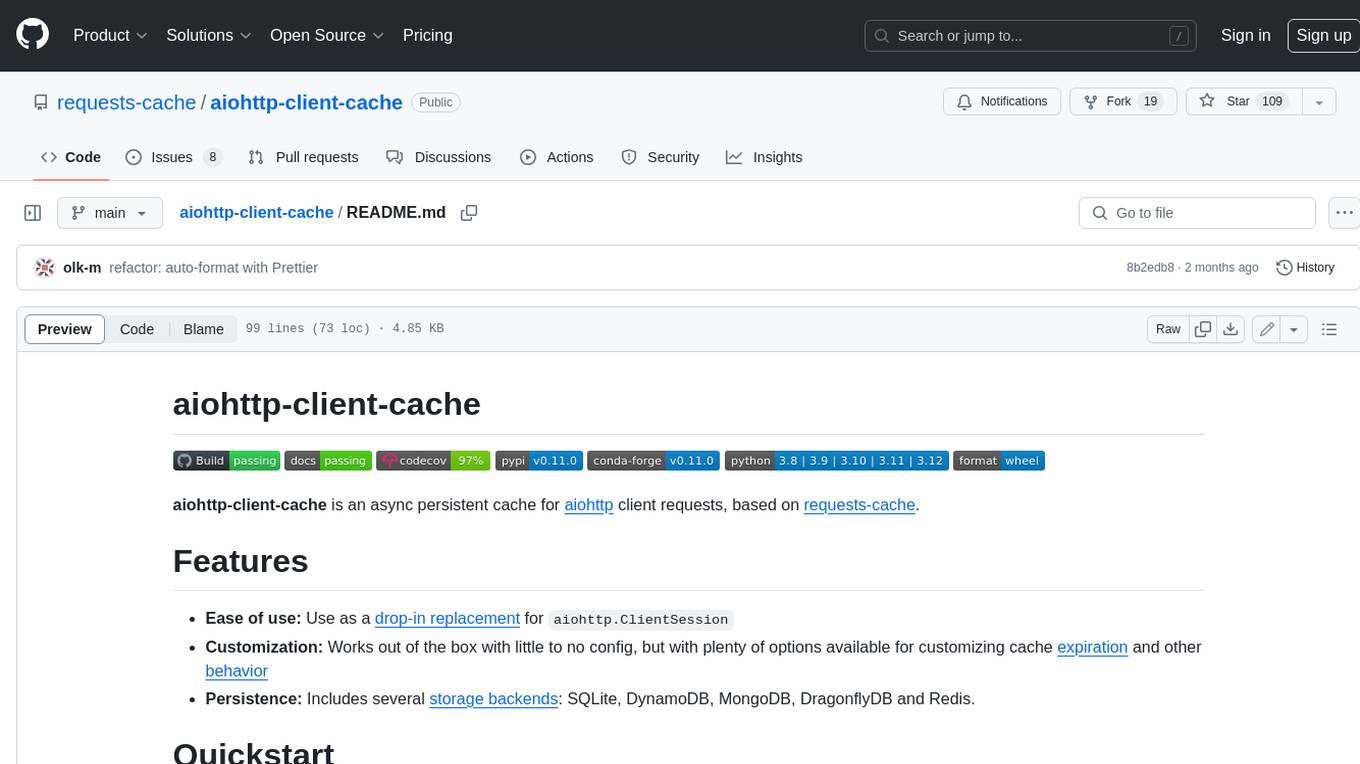
aiohttp-client-cache
aiohttp-client-cache is an asynchronous persistent cache for aiohttp client requests, based on requests-cache. It is easy to use, customizable, and persistent, with several storage backends available, including SQLite, DynamoDB, MongoDB, DragonflyDB, and Redis.
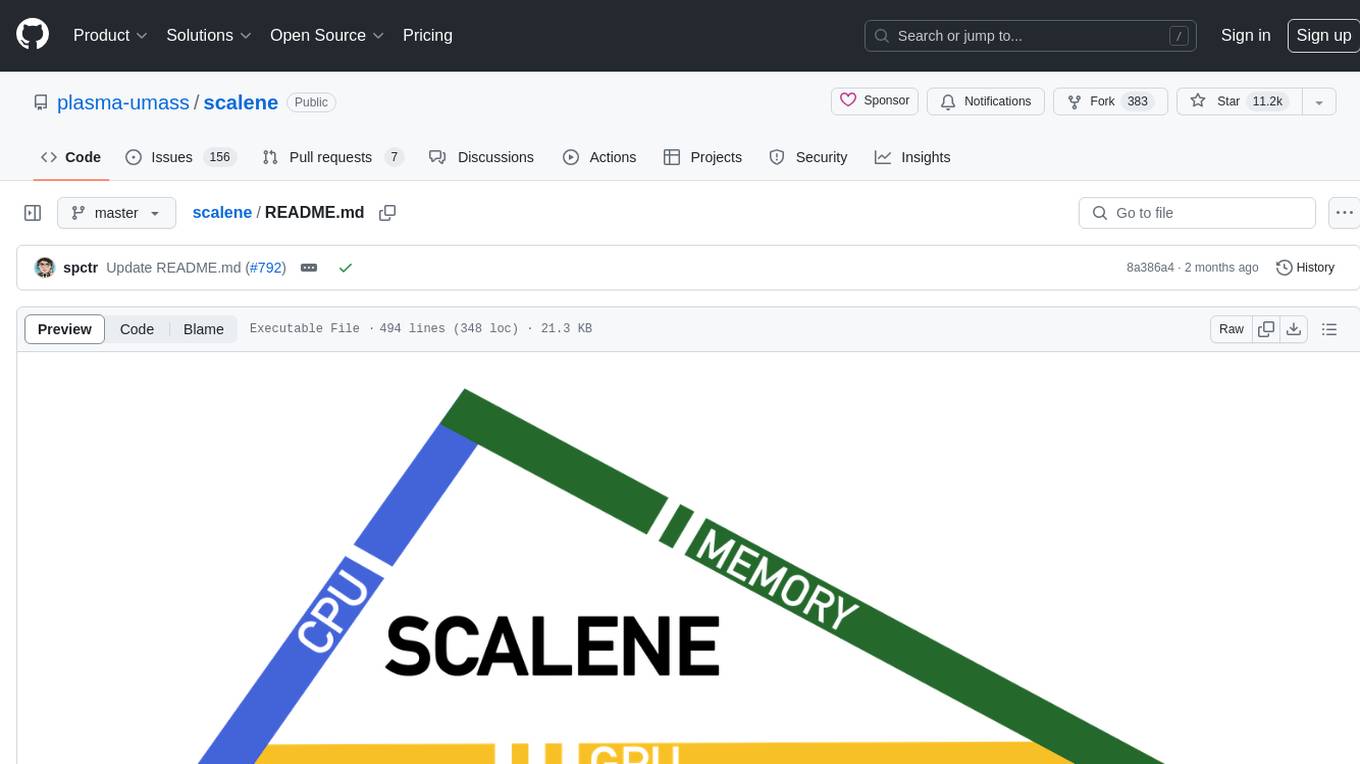
scalene
Scalene is a high-performance CPU, GPU, and memory profiler for Python that provides detailed information and runs faster than many other profilers. It incorporates AI-powered proposed optimizations, allowing users to generate optimization suggestions by clicking on specific lines or regions of code. Scalene separates time spent in Python from native code, highlights hotspots, and identifies memory usage per line. It supports GPU profiling on NVIDIA-based systems and detects memory leaks. Users can generate reduced profiles, profile specific functions using decorators, and suspend/resume profiling for background processes. Scalene is available as a pip or conda package and works on various platforms. It offers features like profiling at the line level, memory trends, copy volume reporting, and leak detection.
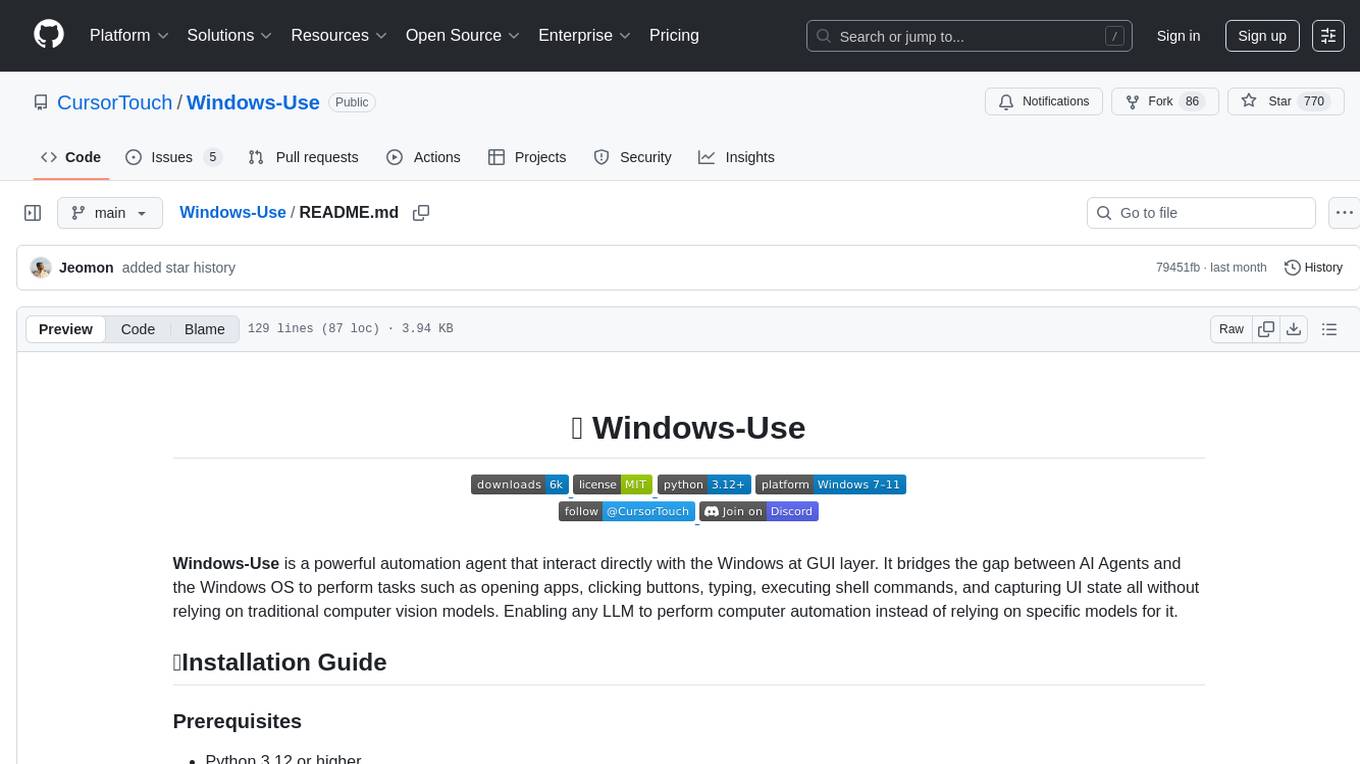
Windows-Use
Windows-Use is a powerful automation agent that interacts directly with the Windows OS at the GUI layer. It bridges the gap between AI agents and Windows to perform tasks such as opening apps, clicking buttons, typing, executing shell commands, and capturing UI state without relying on traditional computer vision models. It enables any large language model (LLM) to perform computer automation instead of relying on specific models for it.
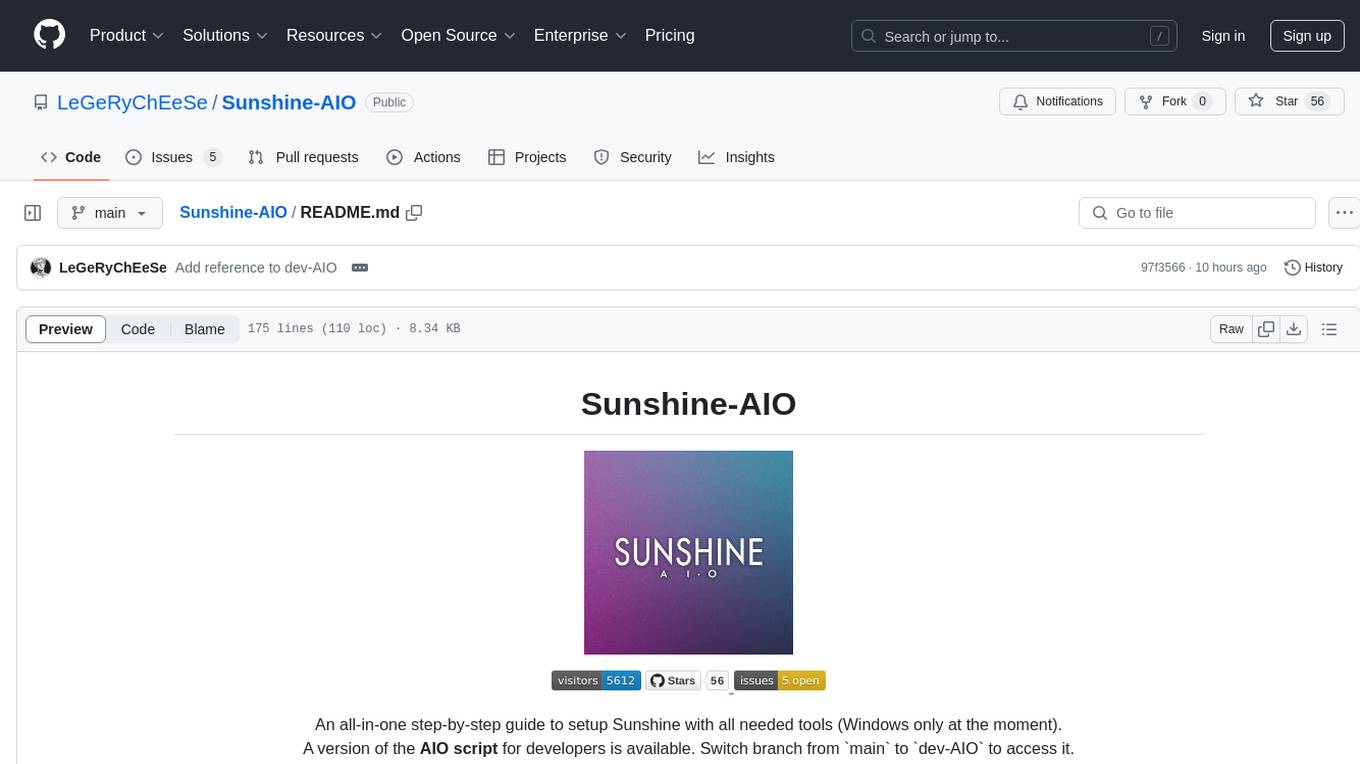
Sunshine-AIO
Sunshine-AIO is an all-in-one step-by-step guide to set up Sunshine with all necessary tools for Windows users. It provides a dedicated display for game streaming, virtual monitor switching, automatic resolution adjustment, resource-saving features, game launcher integration, and stream management. The project aims to evolve into an AIO tool as it progresses, welcoming contributions from users.
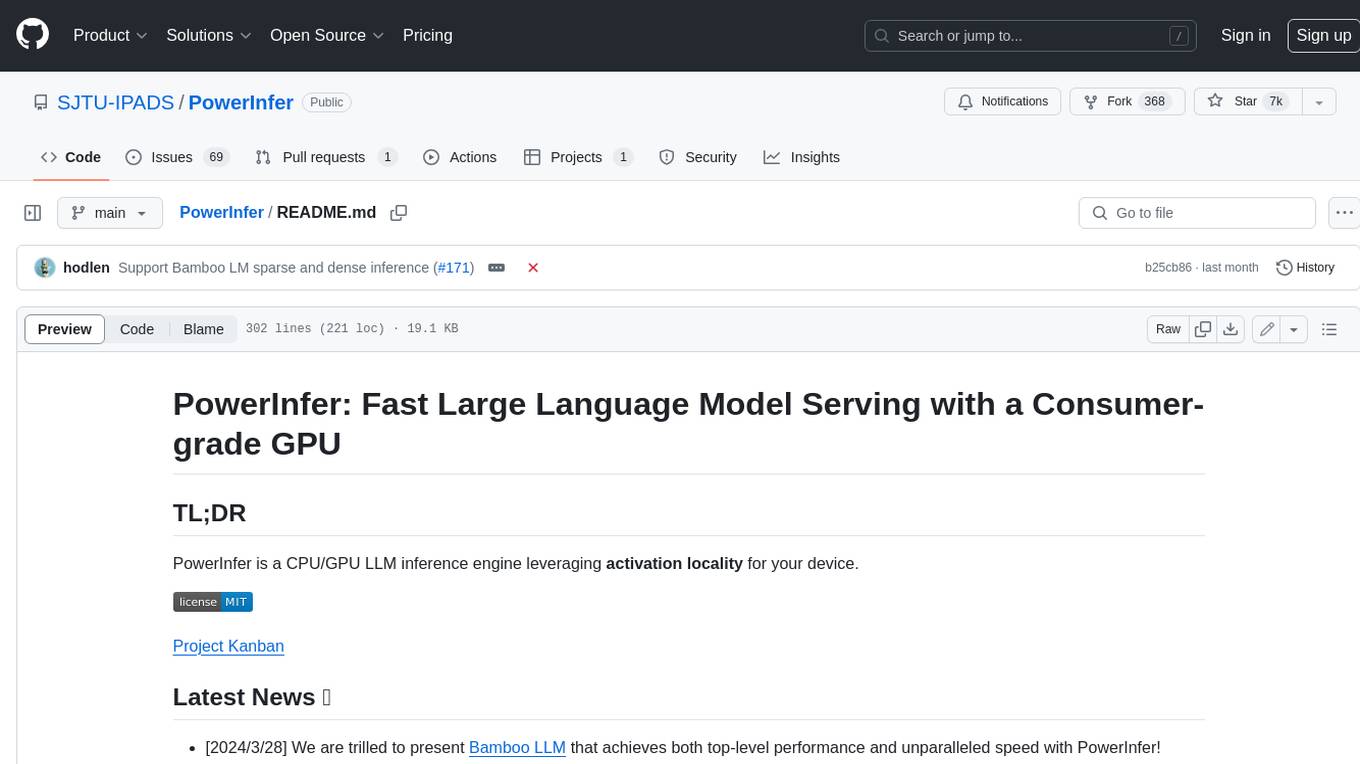
PowerInfer
PowerInfer is a high-speed Large Language Model (LLM) inference engine designed for local deployment on consumer-grade hardware, leveraging activation locality to optimize efficiency. It features a locality-centric design, hybrid CPU/GPU utilization, easy integration with popular ReLU-sparse models, and support for various platforms. PowerInfer achieves high speed with lower resource demands and is flexible for easy deployment and compatibility with existing models like Falcon-40B, Llama2 family, ProSparse Llama2 family, and Bamboo-7B.
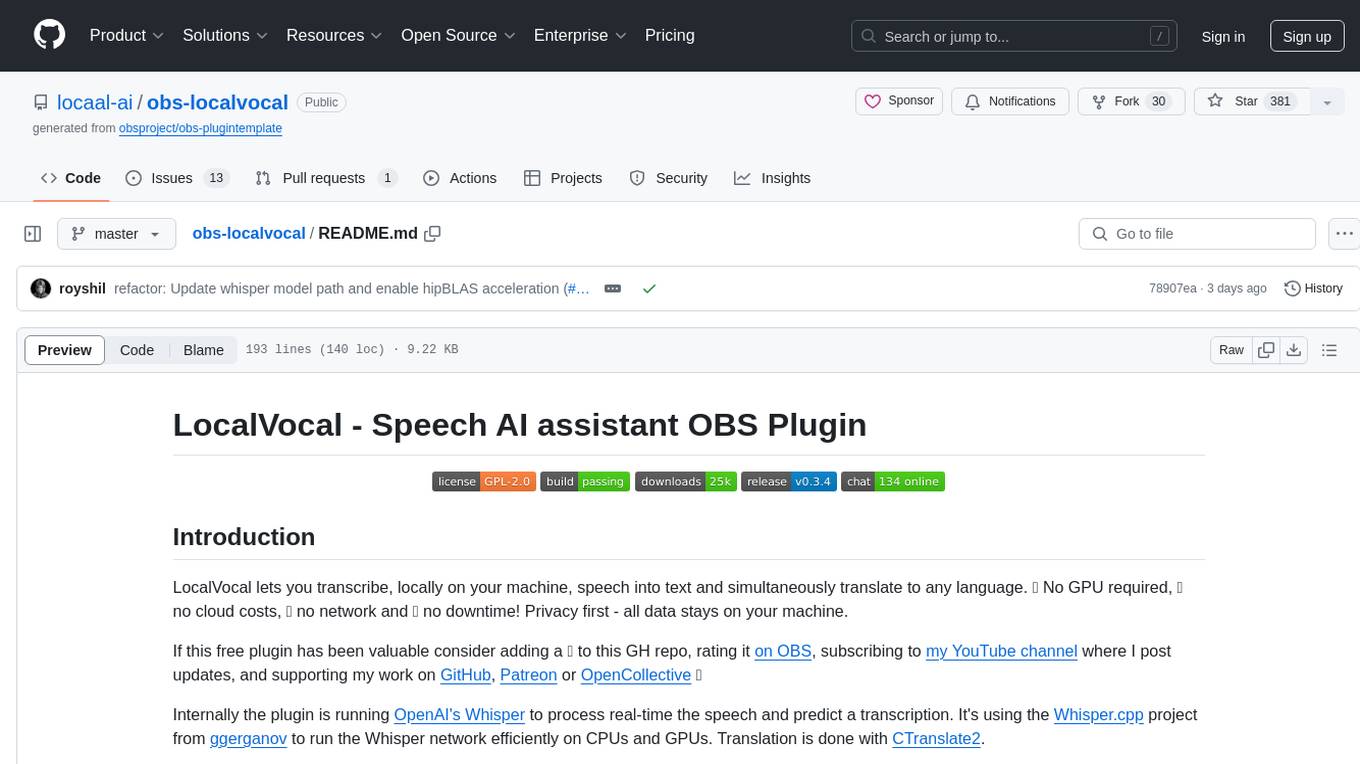
obs-localvocal
LocalVocal is a Speech AI assistant OBS Plugin that enables users to transcribe speech into text and translate it into any language locally on their machine. The plugin runs OpenAI's Whisper for real-time speech processing and prediction. It supports features like transcribing audio in real-time, displaying captions on screen, sending captions to files, syncing captions with recordings, and translating captions to major languages. Users can bring their own Whisper model, filter or replace captions, and experience partial transcriptions for streaming. The plugin is privacy-focused, requiring no GPU, cloud costs, network, or downtime.
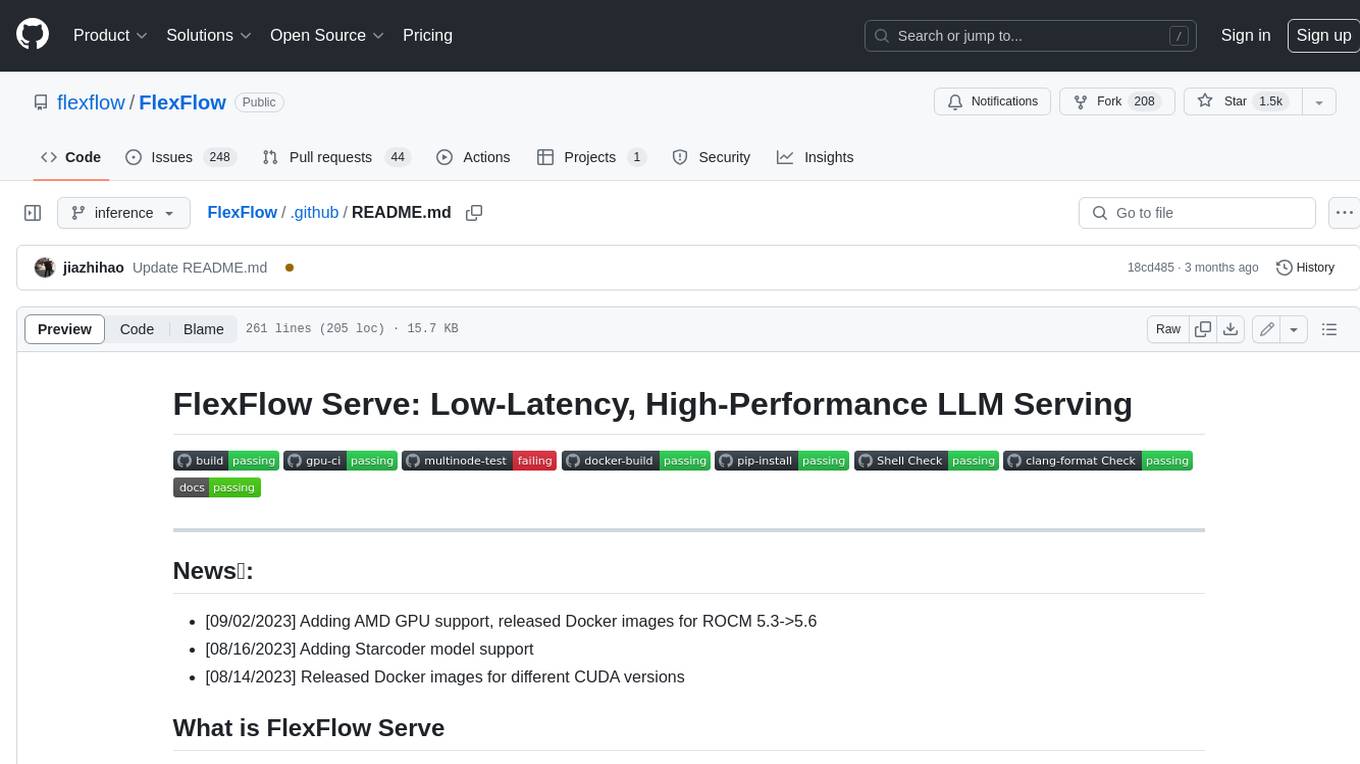
FlexFlow
FlexFlow Serve is an open-source compiler and distributed system for **low latency**, **high performance** LLM serving. FlexFlow Serve outperforms existing systems by 1.3-2.0x for single-node, multi-GPU inference and by 1.4-2.4x for multi-node, multi-GPU inference.

raglite
RAGLite is a Python toolkit for Retrieval-Augmented Generation (RAG) with PostgreSQL or SQLite. It offers configurable options for choosing LLM providers, database types, and rerankers. The toolkit is fast and permissive, utilizing lightweight dependencies and hardware acceleration. RAGLite provides features like PDF to Markdown conversion, multi-vector chunk embedding, optimal semantic chunking, hybrid search capabilities, adaptive retrieval, and improved output quality. It is extensible with a built-in Model Context Protocol server, customizable ChatGPT-like frontend, document conversion to Markdown, and evaluation tools. Users can configure RAGLite for various tasks like configuring, inserting documents, running RAG pipelines, computing query adapters, evaluating performance, running MCP servers, and serving frontends.
For similar tasks
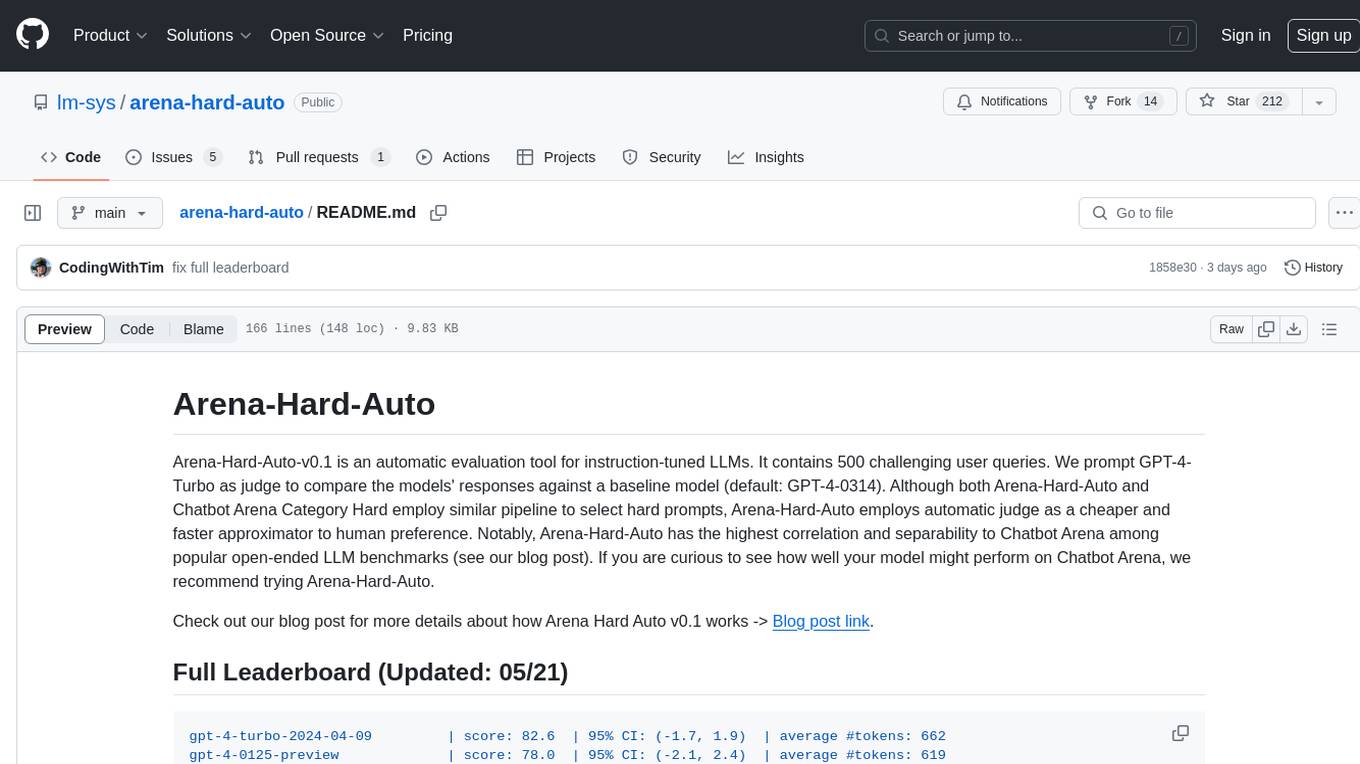
arena-hard-auto
Arena-Hard-Auto-v0.1 is an automatic evaluation tool for instruction-tuned LLMs. It contains 500 challenging user queries. The tool prompts GPT-4-Turbo as a judge to compare models' responses against a baseline model (default: GPT-4-0314). Arena-Hard-Auto employs an automatic judge as a cheaper and faster approximator to human preference. It has the highest correlation and separability to Chatbot Arena among popular open-ended LLM benchmarks. Users can evaluate their models' performance on Chatbot Arena by using Arena-Hard-Auto.
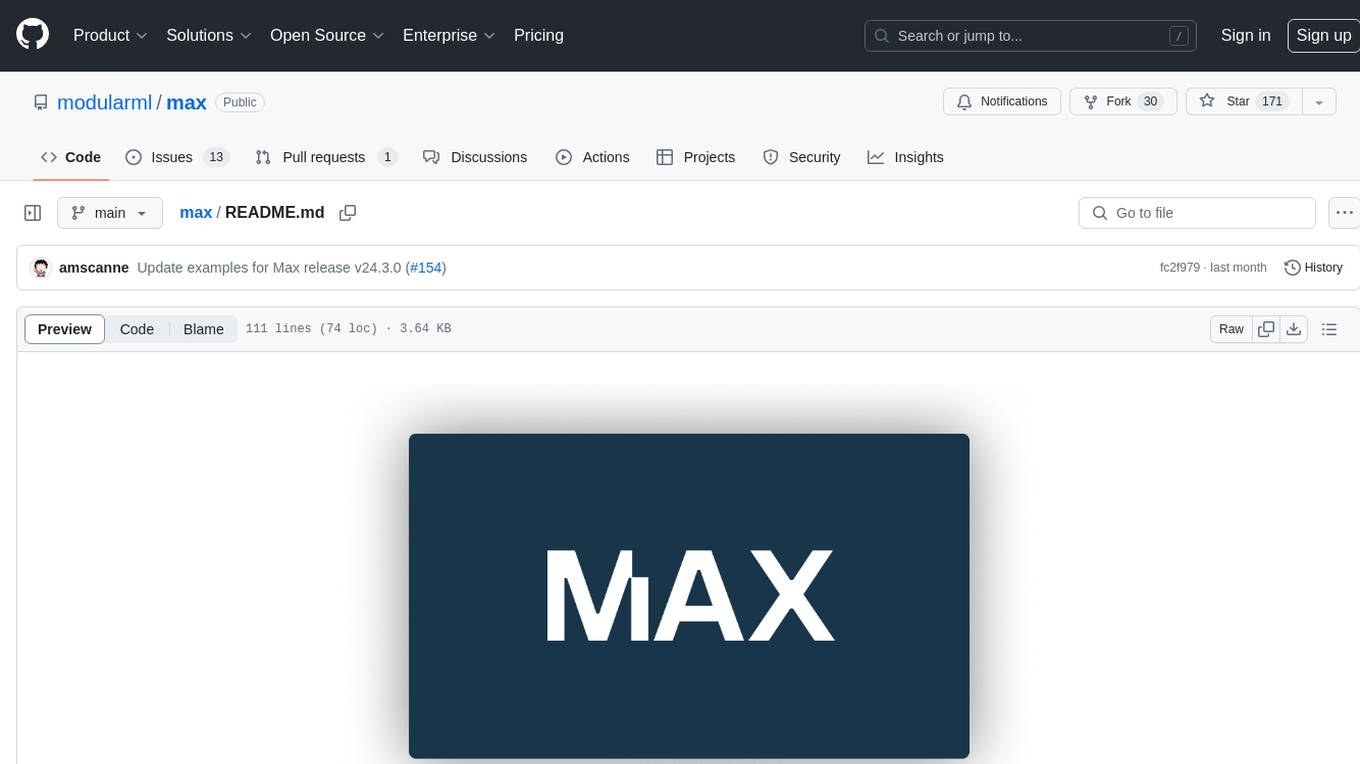
max
The Modular Accelerated Xecution (MAX) platform is an integrated suite of AI libraries, tools, and technologies that unifies commonly fragmented AI deployment workflows. MAX accelerates time to market for the latest innovations by giving AI developers a single toolchain that unlocks full programmability, unparalleled performance, and seamless hardware portability.
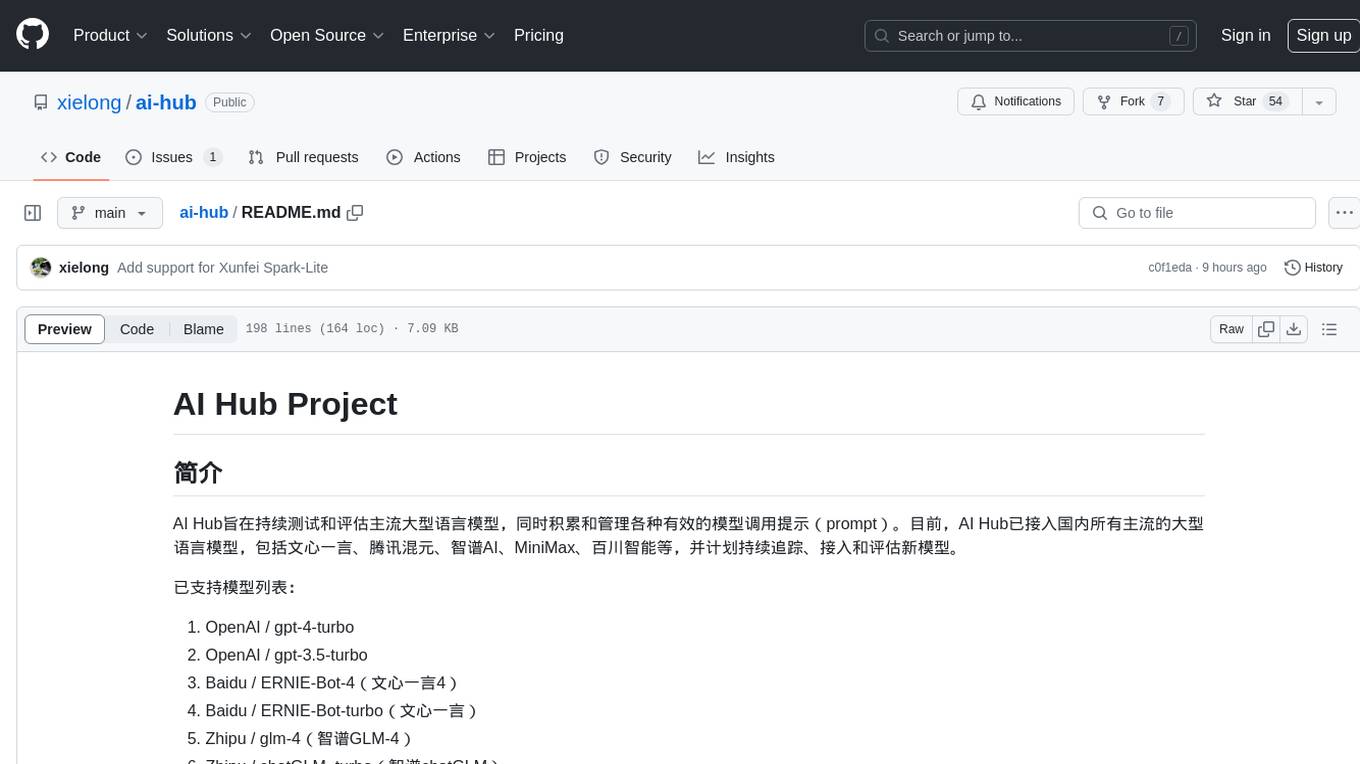
ai-hub
AI Hub Project aims to continuously test and evaluate mainstream large language models, while accumulating and managing various effective model invocation prompts. It has integrated all mainstream large language models in China, including OpenAI GPT-4 Turbo, Baidu ERNIE-Bot-4, Tencent ChatPro, MiniMax abab5.5-chat, and more. The project plans to continuously track, integrate, and evaluate new models. Users can access the models through REST services or Java code integration. The project also provides a testing suite for translation, coding, and benchmark testing.
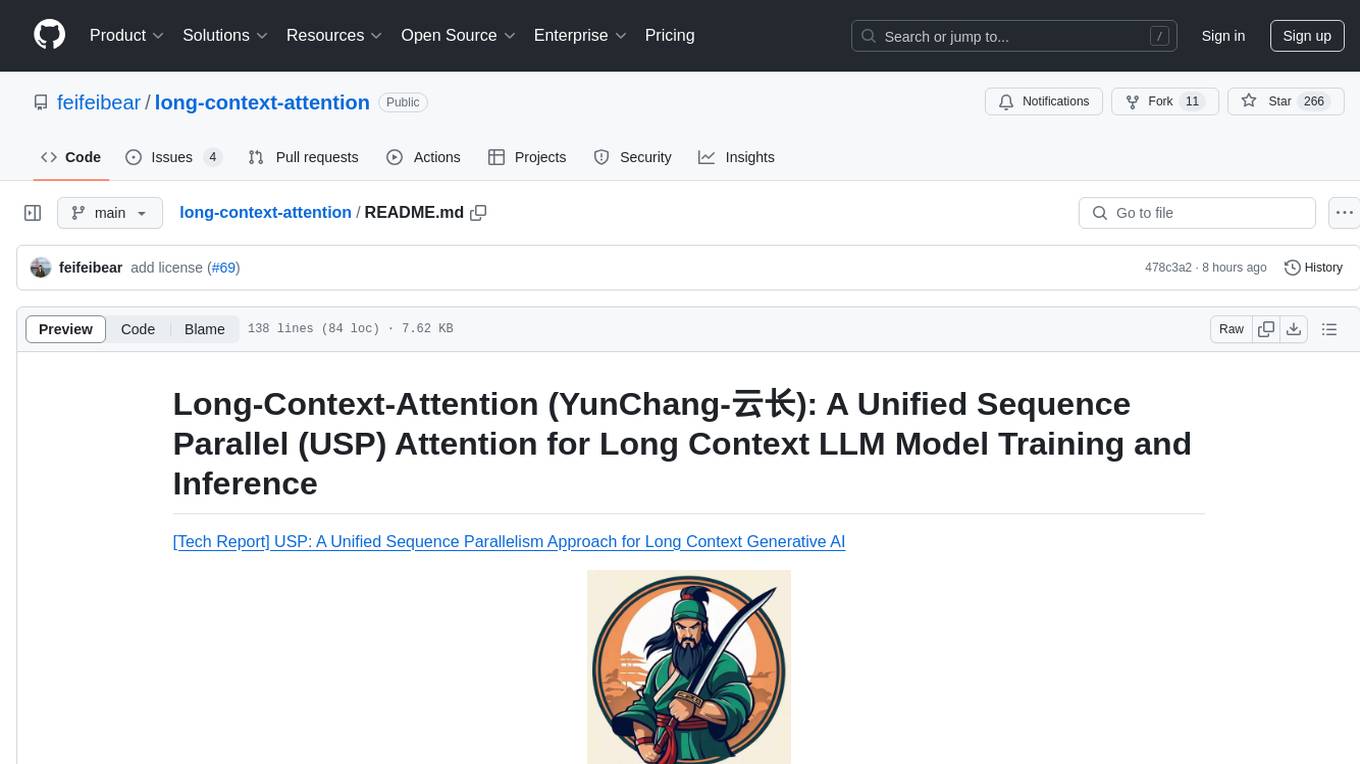
long-context-attention
Long-Context-Attention (YunChang) is a unified sequence parallel approach that combines the strengths of DeepSpeed-Ulysses-Attention and Ring-Attention to provide a versatile and high-performance solution for long context LLM model training and inference. It addresses the limitations of both methods by offering no limitation on the number of heads, compatibility with advanced parallel strategies, and enhanced performance benchmarks. The tool is verified in Megatron-LM and offers best practices for 4D parallelism, making it suitable for various attention mechanisms and parallel computing advancements.
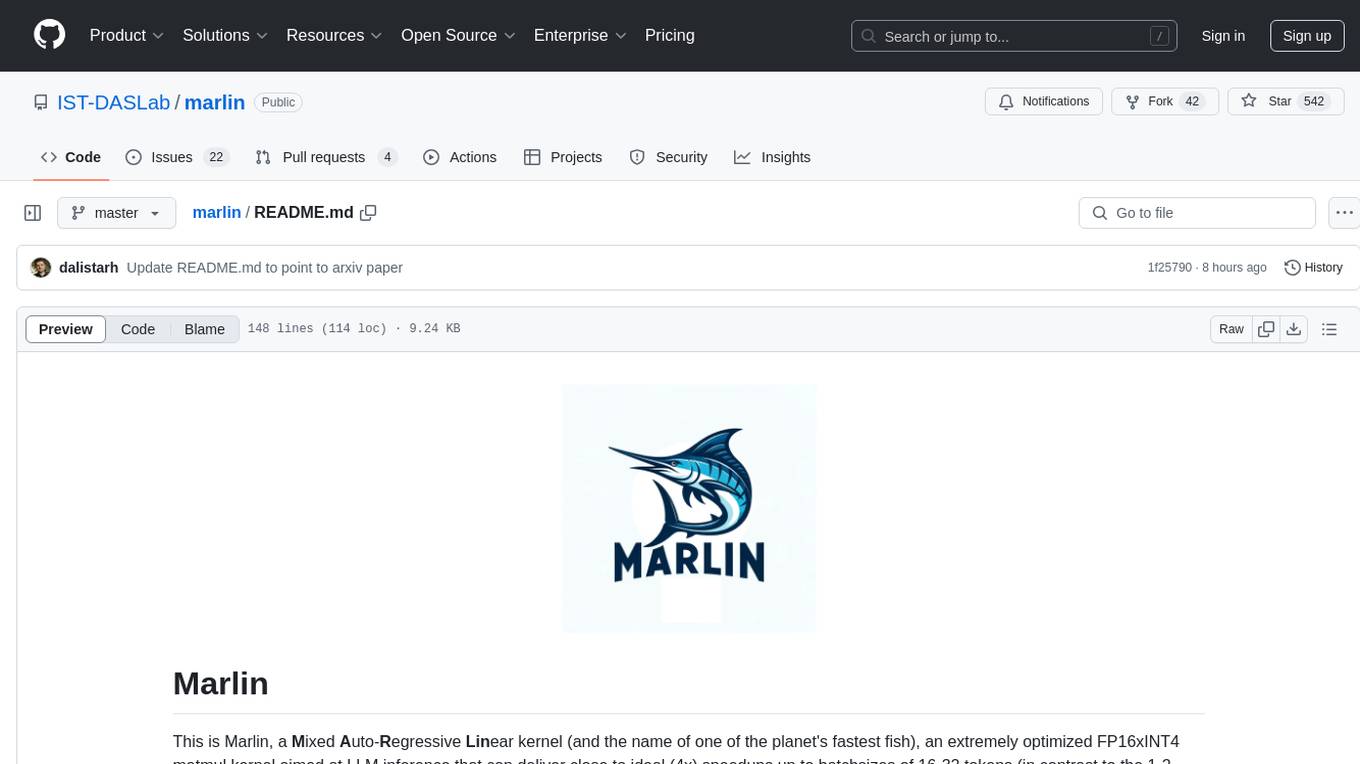
marlin
Marlin is a highly optimized FP16xINT4 matmul kernel designed for large language model (LLM) inference, offering close to ideal speedups up to batchsizes of 16-32 tokens. It is suitable for larger-scale serving, speculative decoding, and advanced multi-inference schemes like CoT-Majority. Marlin achieves optimal performance by utilizing various techniques and optimizations to fully leverage GPU resources, ensuring efficient computation and memory management.
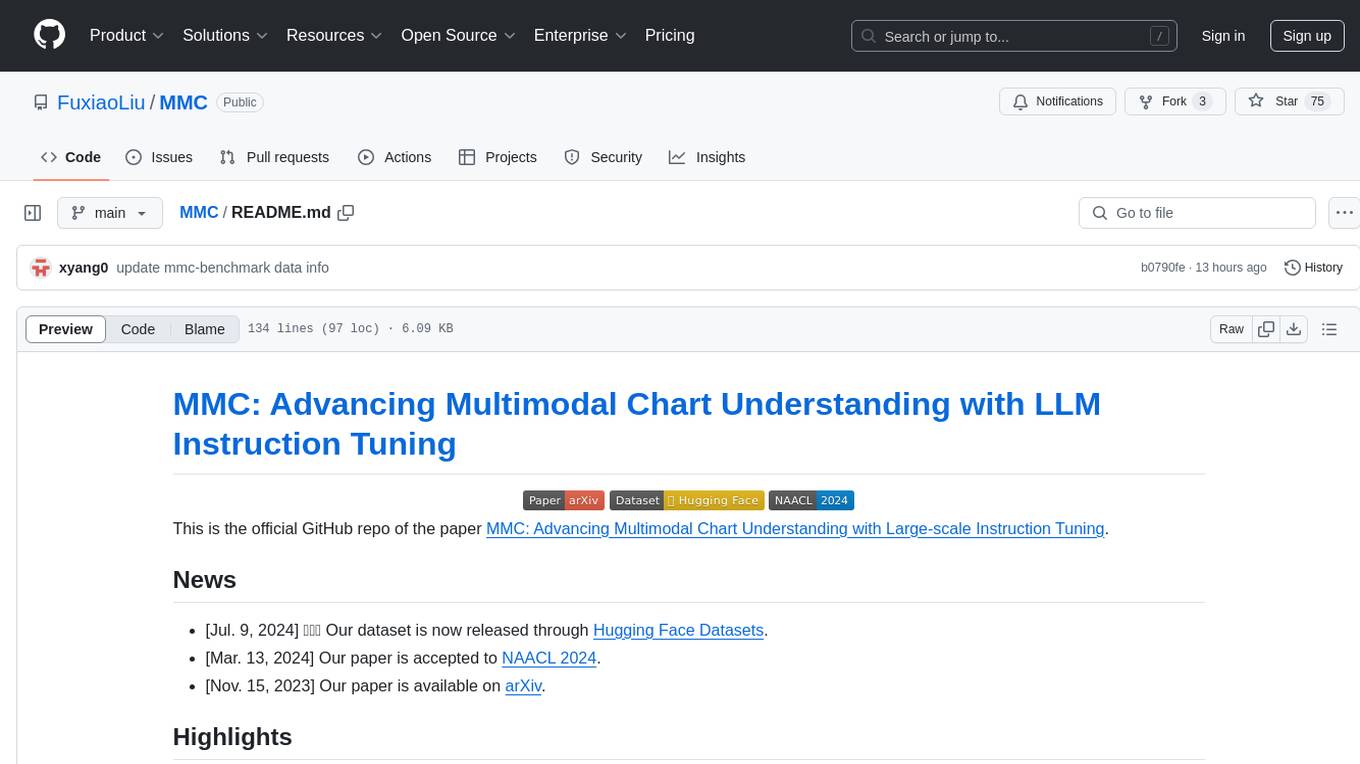
MMC
This repository, MMC, focuses on advancing multimodal chart understanding through large-scale instruction tuning. It introduces a dataset supporting various tasks and chart types, a benchmark for evaluating reasoning capabilities over charts, and an assistant achieving state-of-the-art performance on chart QA benchmarks. The repository provides data for chart-text alignment, benchmarking, and instruction tuning, along with existing datasets used in experiments. Additionally, it offers a Gradio demo for the MMCA model.
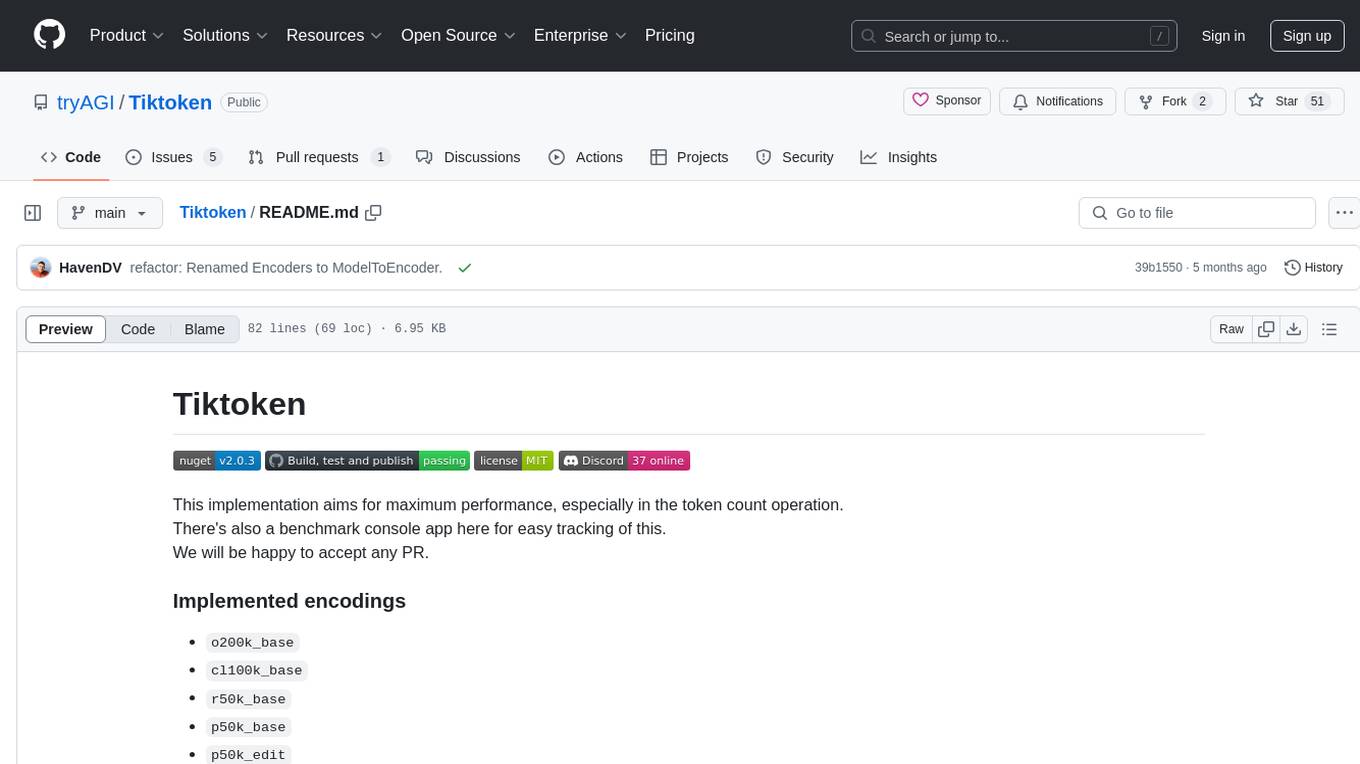
Tiktoken
Tiktoken is a high-performance implementation focused on token count operations. It provides various encodings like o200k_base, cl100k_base, r50k_base, p50k_base, and p50k_edit. Users can easily encode and decode text using the provided API. The repository also includes a benchmark console app for performance tracking. Contributions in the form of PRs are welcome.

ppl.llm.serving
ppl.llm.serving is a serving component for Large Language Models (LLMs) within the PPL.LLM system. It provides a server based on gRPC and supports inference for LLaMA. The repository includes instructions for prerequisites, quick start guide, model exporting, server setup, client usage, benchmarking, and offline inference. Users can refer to the LLaMA Guide for more details on using this serving component.
For similar jobs

weave
Weave is a toolkit for developing Generative AI applications, built by Weights & Biases. With Weave, you can log and debug language model inputs, outputs, and traces; build rigorous, apples-to-apples evaluations for language model use cases; and organize all the information generated across the LLM workflow, from experimentation to evaluations to production. Weave aims to bring rigor, best-practices, and composability to the inherently experimental process of developing Generative AI software, without introducing cognitive overhead.

LLMStack
LLMStack is a no-code platform for building generative AI agents, workflows, and chatbots. It allows users to connect their own data, internal tools, and GPT-powered models without any coding experience. LLMStack can be deployed to the cloud or on-premise and can be accessed via HTTP API or triggered from Slack or Discord.

VisionCraft
The VisionCraft API is a free API for using over 100 different AI models. From images to sound.

kaito
Kaito is an operator that automates the AI/ML inference model deployment in a Kubernetes cluster. It manages large model files using container images, avoids tuning deployment parameters to fit GPU hardware by providing preset configurations, auto-provisions GPU nodes based on model requirements, and hosts large model images in the public Microsoft Container Registry (MCR) if the license allows. Using Kaito, the workflow of onboarding large AI inference models in Kubernetes is largely simplified.

PyRIT
PyRIT is an open access automation framework designed to empower security professionals and ML engineers to red team foundation models and their applications. It automates AI Red Teaming tasks to allow operators to focus on more complicated and time-consuming tasks and can also identify security harms such as misuse (e.g., malware generation, jailbreaking), and privacy harms (e.g., identity theft). The goal is to allow researchers to have a baseline of how well their model and entire inference pipeline is doing against different harm categories and to be able to compare that baseline to future iterations of their model. This allows them to have empirical data on how well their model is doing today, and detect any degradation of performance based on future improvements.

tabby
Tabby is a self-hosted AI coding assistant, offering an open-source and on-premises alternative to GitHub Copilot. It boasts several key features: * Self-contained, with no need for a DBMS or cloud service. * OpenAPI interface, easy to integrate with existing infrastructure (e.g Cloud IDE). * Supports consumer-grade GPUs.

spear
SPEAR (Simulator for Photorealistic Embodied AI Research) is a powerful tool for training embodied agents. It features 300 unique virtual indoor environments with 2,566 unique rooms and 17,234 unique objects that can be manipulated individually. Each environment is designed by a professional artist and features detailed geometry, photorealistic materials, and a unique floor plan and object layout. SPEAR is implemented as Unreal Engine assets and provides an OpenAI Gym interface for interacting with the environments via Python.

Magick
Magick is a groundbreaking visual AIDE (Artificial Intelligence Development Environment) for no-code data pipelines and multimodal agents. Magick can connect to other services and comes with nodes and templates well-suited for intelligent agents, chatbots, complex reasoning systems and realistic characters.
